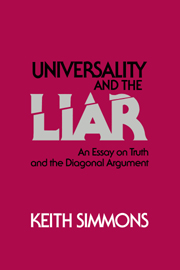Book contents
- Frontmatter
- Contents
- Preface
- Chapter 1 The Liar paradox
- Chapter 2 The diagonal argument
- Chapter 3 The diagonal argument and the Liar, I
- Chapter 4 The diagonal argument and the Liar, II
- Chapter 5 A medieval solution to the Liar
- Chapter 6 A singularity solution to the Liar
- Chapter 7 A formal account of singularities
- Chapter 8 Applications and further singularities
- Chapter 9 Semantic universality
- Notes
- Bibliography
- Index
Chapter 3 - The diagonal argument and the Liar, I
Published online by Cambridge University Press: 19 October 2009
- Frontmatter
- Contents
- Preface
- Chapter 1 The Liar paradox
- Chapter 2 The diagonal argument
- Chapter 3 The diagonal argument and the Liar, I
- Chapter 4 The diagonal argument and the Liar, II
- Chapter 5 A medieval solution to the Liar
- Chapter 6 A singularity solution to the Liar
- Chapter 7 A formal account of singularities
- Chapter 8 Applications and further singularities
- Chapter 9 Semantic universality
- Notes
- Bibliography
- Index
Summary
In this chapter and the next, our analysis of good and bad diagonal arguments is applied to a variety of leading solutions to the Liar. I shall argue that good diagonal arguments show the inadequacy of several current proposals. These proposals, though quite different in nature, are shown to fail for the same reason: They fail to capture our ordinary semantic concepts. I shall also argue that another proposal, according to which natural languages are not universal but rather expressively incomplete, gives rise to a bad diagonal argument, and so leads us back to paradox. The critical examination of these proposals provides criteria of adequacy for any solution to the Liar.
In Chapter 1, we saw that diagonalization and semantic universality tend in opposite directions. We spoke of “diagonalizing out of a language”: Given any language, a diagonal construction apparently produces semantic concepts beyond the expressive capacity of the language. And yet, it seems, natural languages are semantically universal: Any natural language can express its own semantic concepts. It would appear that we must either find fault with the diagonal construction or else give up semantic universality.
Some truth-value gap theorists are motivated by the intuition that natural languages are universal. According to R. L. Martin, gap solutions of the kind he endorses “retain the intuitive view of language as universal and give up intuitions about what we thought there was to be said”.
- Type
- Chapter
- Information
- Universality and the LiarAn Essay on Truth and the Diagonal Argument, pp. 45 - 61Publisher: Cambridge University PressPrint publication year: 1993



